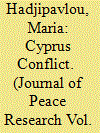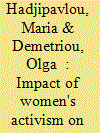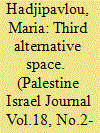| Srl | Item |
| 1 |
ID:
077443


|
|
|
|
|
| Publication |
2007.
|
| Summary/Abstract |
survey in 2000-02 in both the Greek- and Turkish-Cypriot communities examines the beliefs about the root causes of the Cyprus conflict, the political culture, social attitudes, and future solutions. This article shows that both external and internal factors, both psychological and contextual, have played an influential role in the creation and perpetuation of the conflict - a view that challenges the selective official positions that define the problem as either a problem of external factors or merely an internal discord between the majority and minority population. The article highlights the complexity that characterizes intractable conflicts. It promotes the view that internal, contextual, and psychological factors are equally significant, as are legal and political factors, to be taken into account when addressing peacebuilding and future solutions. Some generalizations will be made with regard to the value of micro-level (i.e. societal studies) research in the field of conflict resolution and political psychology
|
|
|
|
|
|
|
|
|
|
|
|
|
|
|
|
| 2 |
ID:
158288


|
|
|
|
|
| Summary/Abstract |
This article focuses on Cypriot women's activism and the work of the Gender Advisory Team (GAT). Referencing United Nations Security Council Resolution 1325, GAT produced specific recommendations to the negotiators and third parties to the Cyprus peace process. In this article, we discuss GAT's recommendations regarding governance and power-sharing from a feminist perspective and the application of a gender-ethnicity nexus in the context of citizenship and belonging. Comparing the parameters used to discuss citizenship in the ongoing Cyprus peace negotiations with those of the 1960 Constitution, in this article we also examine shifts in governmentality through the conflict and postconflict periods, concentrating at each point on presumptions about gender. We argue that current discussions about citizenship are partly the result of unacknowledged considerations of gender, which have been placed on the table by gender activists. This situation poses a question about how we are to interpret the paradoxical incorporation of activist women's voices in peace processes.
|
|
|
|
|
|
|
|
|
|
|
|
|
|
|
|
| 3 |
ID:
126950


|
|
|
|
|
| Publication |
2012.
|
| Summary/Abstract |
In deeply divided societies, where barbed wire and police checkpoints prohibit freedom of movement of both ideas and goal, there exists a suitable environmental for reinforcement of a culture of conflict, mistrust and suspicion as well as a flourishing of "enemy images". According to the Enemy System Theory (Volkan, 1978, 1990; Montville, 1990; Mack, 1990), humans have a deeply rooted psychological need to dichotomize and to create enemies and allies. This phenomenon occurs at the individual as well as group level, where by primitive and unconscious impulses are mobilized and often result in the former neighbors harming and killing each other simply because they belong to different national ethnic group.
|
|
|
|
|
|
|
|
|
|
|
|
|
|
|
|